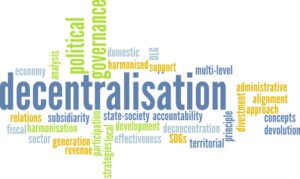FOSDA underscores need for participation in local governance
 The Foundation for Security Development in Africa (FOSDA) has underscored the need for citizen’s participation within the local government system to ensure transparency and accountability in the management of public resources.
The Foundation for Security Development in Africa (FOSDA) has underscored the need for citizen’s participation within the local government system to ensure transparency and accountability in the management of public resources.
Mrs Theodora W. Anti, Programmes Manager, FOSDA noted that accountability helps to improve governance and increased development through better service delivery and empowerment, but citizens needed to be in a position to play their roles effectively.
She said even though Ghana is a decentralized nation, people do not have enough information to act, and as such could not effectively exercise their influence within local government in ensuring good governance.
Mrs Anti made these remarks in an interview with the Ghana News Agency (GNA) on the sidelines of a workshop on citizen action against poverty and inequality in Dodowa in the Greater Accra Region.
It was organised by the Foundation in collaboration with the Shai-Osudoku District Assembly and registered over 100 participants on the theme: “Engendering Stronger Relationships Between the Assembly and Citizens Against Poverty and Inequality”.
Its objectives include; sensitization and education of citizens on their roles in local governance system; demanding accountability and transparency, pushing for developmental projects and helping the Assemblies to mobilize more funds, to improve the livelihoods of the people.
Mrs Anti noted that the project was aimed at educating the citizenry in knowing the opportunities available to be able to effectively execute what was expected of them.
The Programmes Manager said community engagement has proven efficient in the other areas, adding that “when people know how much the Assemblies earn, and are confident that their contributions would not be mismanaged; this promotes transparency”.
Mr Daniel Akuffo, Shai- Osudoku District Chief Executive, said local governance in Ghana played a vital role in the Administration and Development at the Local Areas.
He said the 1992 Constitution provided for ‘Decentralization and Local Governance’ that created a framework for citizens’ participation in decision making and local governance.
Mr Akuffo noted that the provisions of the constitution placed emphasis on decentralization and the components to make it more effective.
He said the decentralization process as enshrined in the constitution designated Metropolitan, Municipal and District Assemblies (MMDAs) as the highest political, legislating, budgeting and planning authority at the local level, adding that “this makes the role of MMDAs in the decentralization process very important and strategic”.
Madam Edith Elikplim Lawuvi, District Development Planning Officer at the Shai-Osudoku District Assembly, described decentralization as a process of bringing public sector decision closer to the public.
She said the concept of decentralization highlights accountable and responsive governance, improves public service delivery and enhanced capacity of residents to participate in local economic development.
Source: GNA
